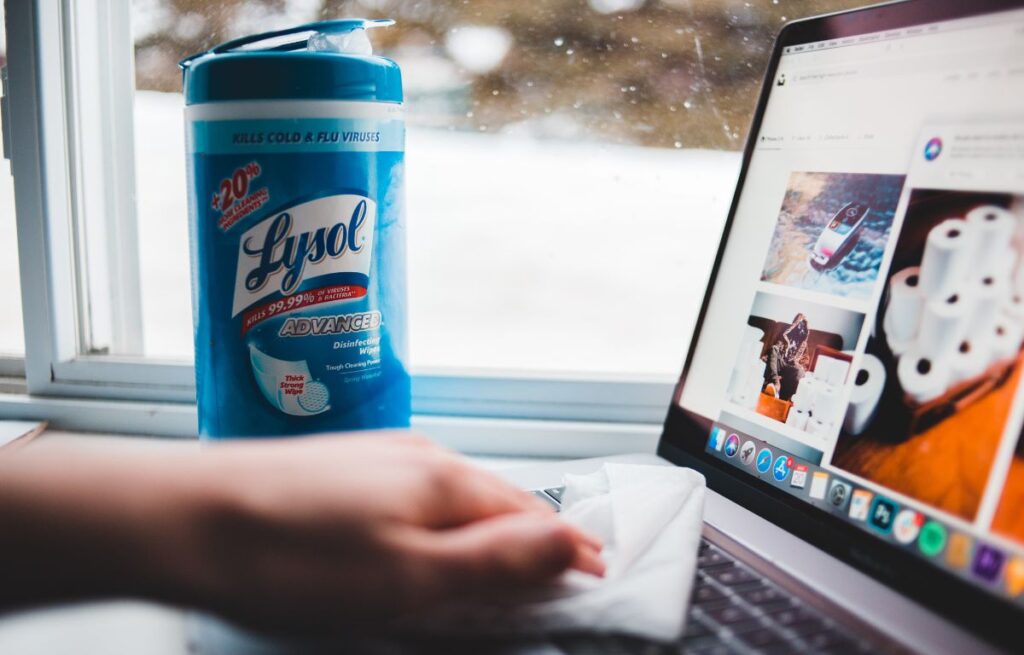7 Steps On How To Clean Laptop Screen at Home

In this guide, we will provide a step-by-step guide on how to clean your laptop screen safely and effectively at home, as well as tips for maintaining the cleanliness of your laptop.

Why To Clean Laptop Regularly
Keeping your laptop clean is essential for maintaining its performance and prolonging its lifespan. A dirty laptop can not only affect its aesthetics but also its overall performance, and in some cases, it can cause damage to the internal components. That’s why it is important to clean your laptop screen regularly.
Steps on How To Clean Laptop Screen At Home
Materials Needed:
- Microfiber cloth
- Distilled water
- Isopropyl alcohol (optional)
Step 1:
Shut down and unplug your laptop Before cleaning your laptop screen, it is important to shut down the device and unplug it from any power source. This is to prevent any damage from electricity and to ensure that you are not accidentally shutting off the power while cleaning the laptop.
Step 2:
Remove any debris Use a soft-bristled brush, such as a toothbrush, to gently remove any debris, dust, or crumbs from the screen and keyboard. Be sure to use a gentle touch, as pressing too hard can scratch the screen. Dust and debris can accumulate in the keyboard, air vents, and other areas of the laptop, which can cause overheating and affect the performance of the device.
Step 3:
Moisten the microfiber cloth Dampen the microfiber cloth with distilled water. Do not soak the cloth, as too much water can damage the screen. Distilled water is the best option because it does not contain any minerals or impurities that can leave streaks or damage the screen.
Step 4:
Clean the screen Gently wipe the screen with the dampened microfiber cloth, using circular motions to remove any dirt or smudges. Be sure to clean the entire screen, including the edges and corners. It’s important to avoid using paper towels or regular cleaning products, as they can scratch the screen and leave fibers behind.
Step 5:
Dry the screen Use a dry portion of the microfiber cloth or a lint-free towel to dry the screen. Be sure to dry the screen thoroughly, as any remaining water droplets can leave streaks or damage the screen.
Step 6:
Optional: Use Isopropyl alcohol If your screen has stubborn stains or smudges that cannot be removed with water, you can use isopropyl alcohol. Dampen a new microfiber cloth with a small amount of alcohol and gently wipe the screen. Isopropyl alcohol is a great option for removing tough stains, but it should be used sparingly, as it can damage the screen if used too often.
Step 7:
Power on the laptop Once you are done cleaning your laptop screen, you can power on the device and continue to use it as normal.
Tips On How To Clean Laptop Screen At Home
- Clean your laptop regularly to prevent dirt and grime from building up.
- Be careful not to get water or cleaning solutions inside the laptop, as it can damage the internal components.
- Keep your laptop in a cool, dry place to prevent overheating.
- Avoid eating or drinking near your laptop to prevent spills and stains.
- Use a laptop cooling pad to keep the device cool and prevent overheating.
It is important to clean your laptop regularly as dust and debris can accumulate in the keyboard, air vents, and other areas of the laptop, which can cause overheating and affect the performance of the device. Dust and debris can also cause the fans to work harder, which can lead to a decrease in performance and an increase in noise. Overheating can also cause damage to
the internal components of the laptop, such as the battery and the processor, leading to costly repairs or replacements.
Another important reason to keep your laptop clean is to prevent the buildup of bacteria and germs. Laptops are commonly used in various environments, such as in homes, offices, and public spaces, which can make them a breeding ground for germs and bacteria. Not only is this unsanitary, but it can also lead to health problems, such as allergies and respiratory issues. Cleaning your laptop regularly can help to remove these harmful contaminants and prevent the spread of germs.
Regular cleaning of the laptop screen is also important for maintaining its appearance and functionality. A dirty screen can cause glare and make it difficult to see the display properly. A smudged screen can also lead to eye strain and headaches, which can be especially problematic for those who use their laptops for extended periods of time. Cleaning the screen can help to improve the visibility and reduce eye strain, making it easier to use your laptop for extended periods of time.
Conclusion
Overall, cleaning your laptop screen regularly is an essential part of maintaining the performance, lifespan, and appearance of your device. By following the steps outlined above, you can safely and effectively clean your laptop screen at home, and keep it free of dirt, dust, and germs. Additionally, by taking the time to maintain your laptop and keeping it clean, you can prevent costly repairs, improve the performance and extend the life of your device.


